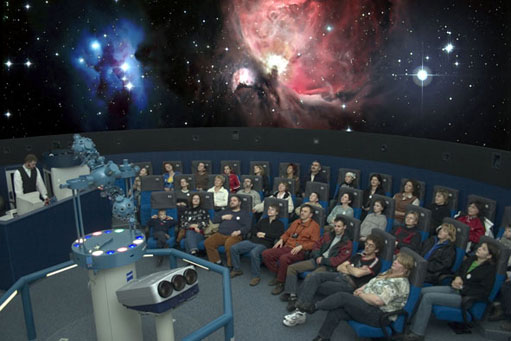
ATLAS e-News
23 February 2011
ATLAS Outreach seeks new stage
19 October 2010

In a planetarium, images are projected onto a large dome-shaped screen.
ATLAS Outreach has initiated a broad range of activities during the past 12 years, but now has set its eyes on an even more ambitious project. A group of people from Berkeley, the University of Texas Arlington, Michigan State University and CERN have taken the first steps towards making a planetarium show in collaboration with a growing set of planetariums.
This will be a professionally produced, high-quality show, and as such costs more than any previous outreach project. The organisers are seeking funds from ATLAS institutions, national funding agencies, foundations, companies, and even wealthy individuals. They hope many people in ATLAS will help with the fundraising effort. The commitment of ATLAS institutions will be critical in raising the remainder of the funds.
The show will focus on dark matter, beginning with the creation of dark matter in the Big Bang. This dark matter led to the formation of galaxies and stars. The show will next describe the astrophysics evidence for the dark matter (collisions of clusters of galaxies, rotating spiral galaxies, etc.).
A strong emphasis will be that dark matter is not just something way out there in space, but right here on Earth (even in the planetarium). Signs of the Big Bang relics (dark matter) might be found in deep underground experiments. The LHC creates miniature "Big Bangs" that may produce more dark matter that we may see soon and analyse to discover its nature. The show will feature exciting animations of ATLAS and LHC.
Supporting institutes will have the first opportunity to sponsor the show in their home language.
The planetarium show will bring the adventure of discovery to large numbers of students and the general public. For more information, and to pledge an offer of support, please contact Michael Barnett or Kaushik De.

Michael BarnettLawrence Berkeley
|